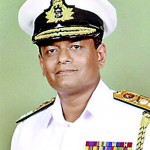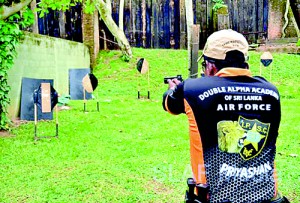All cogs must fit perfectly if rifle shooting is to run smoothly
Shooting is one sport that Sri Lanka has done greater on par with many other sports at international level. And it was one of the sports to be administered under an interim committee for until the dawn of 2014 despite its startling achievements.
With much tumult Rear Admiral Shemal Fernando, an experienced campaigner in sports administration, was unanimously picked to lead the newly elected officials but the naval officer believes that all cogs must fit perfectly if anything, in this case the sport, to run smoothly. Shooting sports, an Olympic sport where Sri Lanka has had many representations at, will come under a stressful first few months, with many tasks ahead.
With the ongoing brew between the Ministry of Sports and the National Olympic Committee of Sri Lanka continuing, one of the important objectives the National Shooting Sports Federation (NSSF) will be to recompose its current constitution, and get it approved by the International Shooting Sports Federation (ISSF). The NSSF will be one of the 25 sports governing bodies that will have to alter its constitution upon the recommendation of the International Olympic Committee (IOC), but Fernando is of the view that if Sri Lanka is to earn the reputation of a top sporting nation all should work together leaving aside differences.
“From what I have learnt, the international affiliation of a relevant sport is important because they support that sport at continental level. A body has to be part and parcel of the international body. At the same time if you are intending to take part at Olympics, the link with the International Olympic Committee (IOC) is very important. The local constitution should fulfil the needs and aspiration of both these international bodies. Locally the body should be part and parcel of the NOC because it’s the supreme sports body which is affiliated to the IOC and in our part the ISSF,” Fernando explained as he asserted the need of the local administrative structure.
“But in a country like Sri Lanka where the budget is given to the Ministry of Sports, they have a bigger say in the development of sport. Any sport will have to have a healthy link with the Ministry of Sports when it comes to development. Also there are other requirements, such as nurturing and development strategies. In Sri Lanka the Ministry of Education also plays an important role in this regard as it covers the schools and the university levels. In addition in Sri Lanka it has to be a joint effort as the Ministry of Sports and the NOC play pivotal roles in sports development. So all these cogs must play equal roles if we are looking at international glory,” he added.
Though it may be a surprise to many rifle shooting is one of the sports that has represented Sri Lanka at Olympics from the beginning of the 21st century. Beginning from Ravi Jayewardene and H. Perera at the Tokyo Games in 1964, Daya Rajasinghe (Munich 1972), Zal Chitty and Daya Rajasinghe (Seoul 1988), Pushpamali Ramanayake (Barcelona 1992), Pushpamali Ramanayake and Malini Wickramasinghe (Atlanta 1996), Ruwani Abeymanne (Sydney 2000), Pushpamali Ramanayake (Athens 2004), E.M. Senanayake (Beijing 2008) and Mangala Samarakoon (London 2012) are its top achievers. Among those who spearheaded to promote the sport in the country are Ravi Jayawardena, Hemasiri Fernando, Lt. Col. Daya Rajasinghe, Group Captain Dick Sallay, Sri Kumaranayagam, Rohana Nanayakkara, Hemasiri Fernando, DIG Sumith Liyanage, Air Vice Marshal Elmo Perera and Lt. Commander Roger, Admiral Wasantha Karannagoda, Rear Admiral Daya Dharmapriya and Admiral Thisara Samarasinghe.
With the rapid development of the sport at school level, where it is turning out to be a popular sport among nearly 100 schools island-wide, since its introduction to the grassroots level in 1992, rifle shooting promises to be the next medal-winning Olympic sport from Sri Lanka. At present 14 clubs, including the armed forces, are engaged in this sport which has grown in numbers and strength. Despite all these progress the NSSF was destined to come under an interim committee for a period of two years.

Shemal for shooting
“In 2006 when I was an official of the former Rifle Shooting Federation of Sri Lanka, we were given a Herculean task to build a shooting range for the South Asian Games in a limited time. We chose the Navy facility in Welisara and there were many areas to concentrate. We managed meet the deadline and successfully conduct the tournament. Later I served as a vice president and during that time, the International Shooting Sports Federation decided that Olympic Shooting should be separated from others. As a result the NSSF was born.”
“But in 2011 the Sports Minister thought that NSSF should come under an interim committee mainly because the sport not producing good results at international level. I was appointed to head that interim committee and it consisted of a good team comprising former national athletes, top individuals and national shooters. From that time onwards we were able to do the basics, which were very much essential. The aim was to bring the sport to national and international level because we had number of former shooters who reached the top at international level, including the Olympics,” he recalled.
Fernando, who comes with heap of experience, running an interim committee that had to begin from zero, further explained that they had already understood the shortcomings and its solutions. Under the interim committee the prime task of the NSSF was to concentrate on conducting its annual competitions, which are of high importance as such competitions have not been conducted for some time.
“During the last two years, we were able to get everything on track and streamline the tournaments. We managed to conduct all competitions, with all facilities provided to the participants. We had a programme to build up the up and coming youngsters but with the new set of officials we will have to conduct it systematically. There is lot of room to improve and there are so many areas where we will need to adopt professionalism.”
“Shooting is a sport that has the capability of winning an Olympic medal. That has been identified by the Ministry of Sports and of course shooting has been rewarded with assistance, financially and materially. When we took over there were around 50 shooters but within two years the number has reached above 150. That’s a significant achievement for any sport in numbers.”
“I feel we have sufficient administrators, at the same time we have good shooters. But we lack on coaches and officials, mainly because we rely much on volunteers. But now onwards we will require fully paid professional coaches and officials. That will be important if we are looking at winning medals at international level. We also need to develop qualified range officials. If these areas are looked into the rest will follow,” he stressed.




